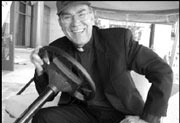Before I went to Seattle University— when I had acne and thought I knew everything—I thought I knew exactly what Jesuits were going to be like. I thought Jesuits were going to be boring white-haired priests who talked in dark classrooms on rainy days about Thomas Aquinas and the Holy Roman Empire. I thought they were going to be stubborn and unquestioning.
But I was 18 years old, and like all 18-year-olds, I was an idiot. The Rev. James Reichmann laid it down for me on my first day of class.
“You don’t know anything,” he said. “Socrates said, ‘The one thing I know is that I know nothing,’ and if you want to do well here, you should remember that.”
He was the first in a long line of Jesuits who assisted in the smashing of my ego.
Like the Rev. Emmett Carroll in fiction: “Sean, this story needs some work.”
Like the Rev. David Leigh in nonfiction: “This essay isn’t very thorough.”
Like all the SU professors who took a red pen to my tests.
And yet, I only have positive thoughts about these guys. While many people these days seem to think that all priests are lying, conning creeps, I can tell you that the Jesuits I’ve met defy these preconceptions.
Almost every Jesuit at SU has a master’s in theology, a master’s in philosophy, and a masters and Ph.D. in their academic field. Berkeley, Carnegie-Mellon, Harvard, the Gregorian in Rome, and the UW are just a few places where my profs learned about Thomas Aquinas, the sexual allusions in “The Waste Land,” and the nature of autobiography. And yet they’re never bogged down by this education. I’ve never met a pretentious Jesuit. There’s a realism and humanity to Jesuits that are sometimes lacking in lay professors. The Jesuits I know seem to view knowledge as a tool for change; they don’t obtain knowledge for the sake of knowledge. That’s refreshing.
There’s nothing pedantic about Leigh, for example. Leigh, with degrees from Gonzaga, the University of Toronto, and Yale, is probably one of the coolest cats in the world, and he doesn’t even know it. He almost never wears priestly garb, and when he reads “To His Coy Mistress” aloud, you aren’t sure if he’s an ordained priest or a 17th-century pimp. One time we were at a dinner event at which a local poet ate, talked to us students, and made us feel privileged to be in his presence. Leigh was there, and he fell asleep. Not a nodding off or a drifting off—Leigh leaned his head over his chin and slept like a baby.
I’ve met Jesuits who have memorized “The Waste Land,” who play golf every weekend (Leigh was not available to be interviewed because of a golf vacation), who drink whiskey in their dorm when they’re sick, and who are the top Thomas Aquinas scholars in the world. I’ve also known Jesuits who’ve read my essays on topics ranging from Tolstoy’s philosophy on aesthetics to the nature of pornography and said, “Worthy topic. Let’s try and get at this a little further.” Not once has a Jesuit told me, “This topic isn’t worth your time,” or said that I should think in a certain manner. Jesuits are embodiments of Socrates’ quote: They know they know nothing.
Which is ultimately why I’m writing this piece, I suppose—SU’s Jesuit professors have something that seems to be lacking in this skeptical world: humility. In a society so arrogant and perversely infatuated with youth culture, these Jesuits are older, intelligent guys who remind us that we don’t actually know a whole lot. The trick is, though, to try to know more. I remember one afternoon, at an independent study conference, Leigh told me, “You need to look deeper, Sean. Review Aristotle’s ideas of higher wants. You seem to focus on a low level. There’s much more you’re not seeing.”
And now the Jesuits at SU are bringing such wisdom and humility to one of the thorniest subjects they could confront—the clergy sex scandals. In an eloquent and controversial press release recently, the Rev. Steven V. Sundborg, president of SU, listed seven declarations he hoped the United States Conference of Catholic Bishops would implement. One stated, “We reaffirm the dignity of homosexual persons, welcome their contribution to the church, and renew our pastoral care of them. In light of the present crisis, we affirm unmistakably the suitability of homosexual persons to be ordained as priests and to live faithfully the requirements of celibacy. We apologize for any statements on our part that have called their lives and ministry as priests into question.”





